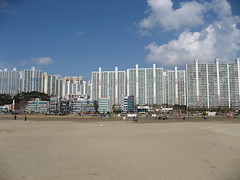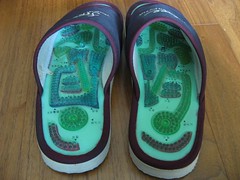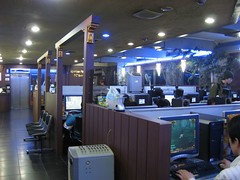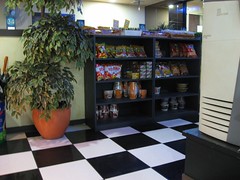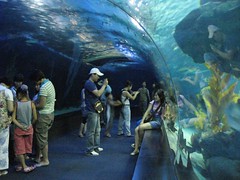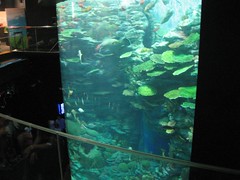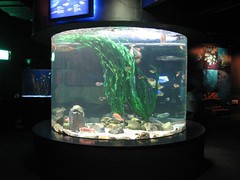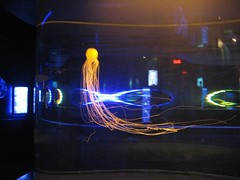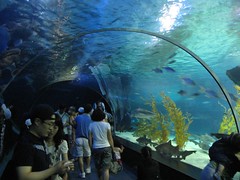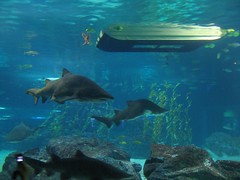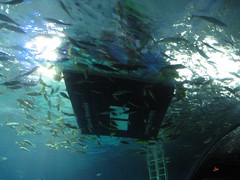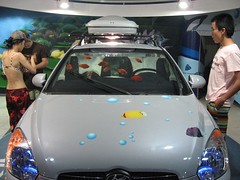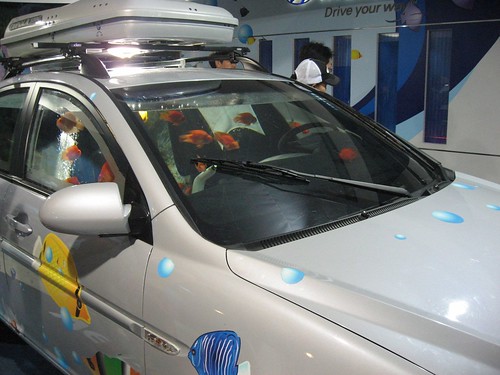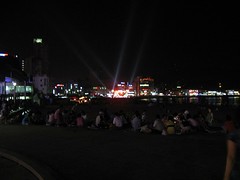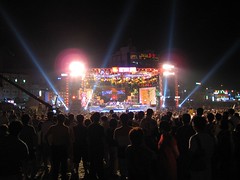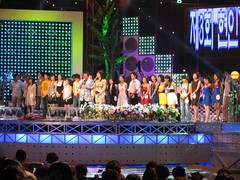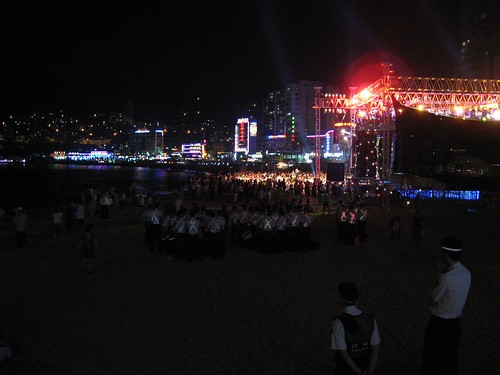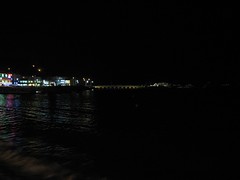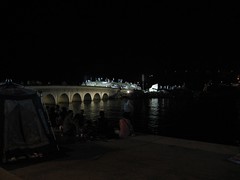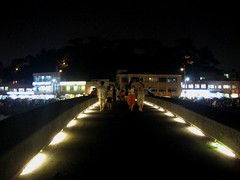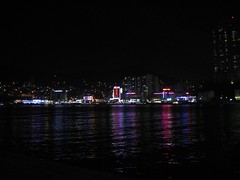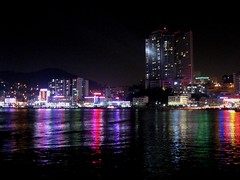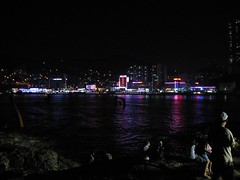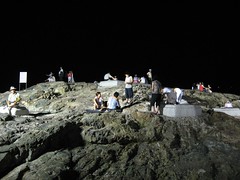I've written before about my great love of Korean apartment building architecture, but it seems that the Government isn't so keen on the Soviet-chic image which so much of the Korean landscape features, and have resolved to do something about it.
So from March next year, developers will no longer be permitted to build row-upon-row of identical characterless boxes, but will instead have to try working with different shapes for a change, as well as varying the heights of the buildings within the concrete jungles which are replacing former green landscapes. Unfortunately, laudable though this new directive is it only applies to Seoul - so certain parts of Busan are still destined to look like Pyongyang for the foreseeable future.
Perhaps though, it doesn't matter so much. Most of the new apartment block developments I've seen here seem to be more individually designed, and that's market forces for you - people these days don't want to live in an apartment block that looks the same as all the others around it. Apart from anything else, how are you supposed to find your building after a night of heavy soju consumption?
Korean tags: 아파트, 건물
Wednesday, August 29, 2007
Tuesday, August 28, 2007
A Voice in the Wilderness
When everyone around me speaks Korean I find it easy for my thoughts to drift towards other things, even though I should be listening and trying to learn. It gets tiring and whether it's just the summer-induced fatigue getting to me, age or simply laziness, my concentration's not what it used to be. So on the very rare occasions when someone unexpected speaks English to me, I often react - if indeed I'm sufficiently tuned in to react at all - with the kind of special look I normally reserve for the times when I find something unpleasant under the fridge.
So when the guy behind the counter at a 7-Eleven or similar convenience store asked "Is there anything I can help you with sir?", there was a moment when the two Koreans I was with suddenly looked up from staring at the snacks and furtively glanced in different directions trying to ascertain where this disembodied non-Korean voice had come from. I remained largely oblivious to the development until the voice tried again. This time he finally got my attention.
And thus began my bi-monthly 'are you a teacher?' conversation, to which replying no invariably results in looks of disbelief and confusion, and occasionally the accusatory face of someone who believes you are lying on the quite reasonable grounds that almost every Westerner in Busan is here for that purpose - officially at least. It probably does not help that due to the heat I am sporting the latest in dishevelled I-am-5000-miles-away-from-my-wardrobe teacher fashion along with a spaced-out look normally associated with drink, drugs or in my case, extreme boredom.
So I am not a teacher and I am not here on holiday and actually I live here although obviously this seems an unlikely story because I clearly can't speak much Korean, and I could mention that I'm a stock market trader but that either raises more questions than it answers, or results in expressions even blanker than mine probably is, and as for that whole business with living here because my government's conspired to keep me from going back home do you really want to know or does that sound even more unbelievable? Are you with the Underground Railroad? No? Then what is there to say?
It was pointed out to me afterwards that he probably wanted to practice his English, but after almost a year of being embedded in Korean society I realise I have all but lost my ability to make small-talk in my native language, and amidst the cultural isolation, possibly much of the sense of my self-identity as well. Nevertheless, two months from now, when my next unexpected English conversation takes place, I must do better, if only for the sake of someone else's language practice.
Korean tags: 영어, 연습, 심심하다
So when the guy behind the counter at a 7-Eleven or similar convenience store asked "Is there anything I can help you with sir?", there was a moment when the two Koreans I was with suddenly looked up from staring at the snacks and furtively glanced in different directions trying to ascertain where this disembodied non-Korean voice had come from. I remained largely oblivious to the development until the voice tried again. This time he finally got my attention.
And thus began my bi-monthly 'are you a teacher?' conversation, to which replying no invariably results in looks of disbelief and confusion, and occasionally the accusatory face of someone who believes you are lying on the quite reasonable grounds that almost every Westerner in Busan is here for that purpose - officially at least. It probably does not help that due to the heat I am sporting the latest in dishevelled I-am-5000-miles-away-from-my-wardrobe teacher fashion along with a spaced-out look normally associated with drink, drugs or in my case, extreme boredom.
So I am not a teacher and I am not here on holiday and actually I live here although obviously this seems an unlikely story because I clearly can't speak much Korean, and I could mention that I'm a stock market trader but that either raises more questions than it answers, or results in expressions even blanker than mine probably is, and as for that whole business with living here because my government's conspired to keep me from going back home do you really want to know or does that sound even more unbelievable? Are you with the Underground Railroad? No? Then what is there to say?
It was pointed out to me afterwards that he probably wanted to practice his English, but after almost a year of being embedded in Korean society I realise I have all but lost my ability to make small-talk in my native language, and amidst the cultural isolation, possibly much of the sense of my self-identity as well. Nevertheless, two months from now, when my next unexpected English conversation takes place, I must do better, if only for the sake of someone else's language practice.
Korean tags: 영어, 연습, 심심하다
Monday, August 27, 2007
An Inspector Calls
There's a Chinese restaurant nearby which has become the regular place Korean Parents meet up with us for lunch. The staff are actually Chinese - and not from the 'Third Korea' of Yanbian province - so the regular highlight for me is watching Korean Father try to communicate with the waitresses and taking comfort from the fact that I'm not the only one having difficulty making myself understood. But the regular routine was broken with the arrival of health inspectors. Having seen the state of some of the cooking areas in places we've eaten I'm amazed that Korea even has such people, but in turns out there are and they proceeded to carefully look around the place, though I doubt they found a problem.
Like a lot of restaurants here, it's quite normal for leftovers to be bagged up and taken home. When the bag was brought to our table, I noticed that this particular one had a slogan in English which read "you can't fine [this restaurant] any where in the world" - which was somewhat ironic under the circumstances. Unfortunately I made the huge mistake of pointing out the error to Korean Father, who decided that he was going to let the staff know immediately. Korean Mother, my wife and I jumped up from the the table and dashed towards the door, and when it became clear from the way he was brandishing the bag that he was going to insist on explaining the matter to the maître d' as my wife paid by the exit, I left the building and waited at a place outside I considered sufficiently out of sight. The moral of the story is tell Korean Father nothing, and there are times when it's best to keep those English errors you've noticed to yourself.
Korean tags: 아버지, 영어, 식당
Like a lot of restaurants here, it's quite normal for leftovers to be bagged up and taken home. When the bag was brought to our table, I noticed that this particular one had a slogan in English which read "you can't fine [this restaurant] any where in the world" - which was somewhat ironic under the circumstances. Unfortunately I made the huge mistake of pointing out the error to Korean Father, who decided that he was going to let the staff know immediately. Korean Mother, my wife and I jumped up from the the table and dashed towards the door, and when it became clear from the way he was brandishing the bag that he was going to insist on explaining the matter to the maître d' as my wife paid by the exit, I left the building and waited at a place outside I considered sufficiently out of sight. The moral of the story is tell Korean Father nothing, and there are times when it's best to keep those English errors you've noticed to yourself.
Korean tags: 아버지, 영어, 식당
Saturday, August 25, 2007
Dark Water
According to one academic, South Korea is the ninth most atheistic country in the world. It struck me as a surprising conclusion, until I realised that the strict definition of atheism used excluded Buddhism, although it still begged the question of why Thailand - currently 94.6% Buddhist according to the CIA World Factbook didn't appear in the top 50, or why North Korea came 33rd considering since the idea that 85% of North Koreans believe in God is contrary to the reality of life there.
In fact though, surveys do suggest that half the population don't identify themselves as Christians or Buddhists, so perhaps they really are aetheists, although it seems more likely many of them are more likely to be agnostic. To my mind, South Korea - a land full of temples, churches and background Confucianism, is a significantly spiritual society.
We were at a hospital when a Buddhist monk came in. Monks are not an uncommon sight in our area of Busan, but what happened next was a little out of the ordinary. As a nurse finished treating him he suddenly stopped and told her "you must be careful of water", which seemed to result in stunned silence on her part. And then he was on his way, meanwhile it's possible the nurse may never go swimming again.
Scratch the surface of Korean society and I suspect there's quite a lot of this kind of thing going on, and even my life has been subject to such advice and insights - either directly or through third parties with whom my existence has come up in discussions with psychics of various kinds. And while no-one has told me to be careful of water, I fear the day a mere sentence from a respected spiritual person launches me into a whole new world of paranoia. Perhaps I can choose not to believe, but this is Korea, and maybe sooner or later it gets to you in a way you can't ignore.
Korean tags: 종교, 불교, 기독교, 물
In fact though, surveys do suggest that half the population don't identify themselves as Christians or Buddhists, so perhaps they really are aetheists, although it seems more likely many of them are more likely to be agnostic. To my mind, South Korea - a land full of temples, churches and background Confucianism, is a significantly spiritual society.
We were at a hospital when a Buddhist monk came in. Monks are not an uncommon sight in our area of Busan, but what happened next was a little out of the ordinary. As a nurse finished treating him he suddenly stopped and told her "you must be careful of water", which seemed to result in stunned silence on her part. And then he was on his way, meanwhile it's possible the nurse may never go swimming again.
Scratch the surface of Korean society and I suspect there's quite a lot of this kind of thing going on, and even my life has been subject to such advice and insights - either directly or through third parties with whom my existence has come up in discussions with psychics of various kinds. And while no-one has told me to be careful of water, I fear the day a mere sentence from a respected spiritual person launches me into a whole new world of paranoia. Perhaps I can choose not to believe, but this is Korea, and maybe sooner or later it gets to you in a way you can't ignore.
Korean tags: 종교, 불교, 기독교, 물
Wednesday, August 22, 2007
School's Out
 School's out for summer - really; children in certain areas of Korea have been told not to return for the new semester because it's too hot. In other cases, the school day has been reduced and classes are only being held in the mornings. It seems that some schools are regularly shut in Korea when temperatures are too high. They say it's about34.5°C inside the classrooms and above 40 when they are full of students. Some schools are too poor to have air conditioning - there's no help from the government so it's down to the parents to raise the funds if they can, but even those that do can't necessarily afford to run it.
School's out for summer - really; children in certain areas of Korea have been told not to return for the new semester because it's too hot. In other cases, the school day has been reduced and classes are only being held in the mornings. It seems that some schools are regularly shut in Korea when temperatures are too high. They say it's about34.5°C inside the classrooms and above 40 when they are full of students. Some schools are too poor to have air conditioning - there's no help from the government so it's down to the parents to raise the funds if they can, but even those that do can't necessarily afford to run it.I don't know how long schools will remain closed - it's currently around 31°C here in Busan - though with the humidity it feels about 10 degrees warmer than that - and the short-term forecast says this is likely to last for at least the rest of the week. Still, it's nothing compared to life in some countries closer to the equator. On the other hand, I am bravely remaining indoors at every available opportunity and I can only imagine the hell that must be a morning commute on a hilariously overcrowded bus throwing everyone around as the driver tries to break the sound barrier.
Last week an official heat warning was issued for Busan. The news reports that seven people died due to the temperatures yesterday, and it now seems obligatory that a shot of Haeundae beach has to be shown during news broadcasts - apparently with as many lingering shots of young Korean women wearing bikinis as possible. It's so crowded these days (allegedly with 600,000 daily visitors) it's difficult to see the sand.
We currently risk fan death on a daily basis by brazenly keeping our electric fan on all night, though it's been a lost cause lately; sleep has been so difficult of late I feel I'm part of a some kind of sleep deprivation experiment. When I wake up in the morning I'm so dehydrated my eyelids feel stuck to my eyeballs and I lunge for the water in the fridge like a man reaching an oasis in the desert. The net result of everything is debilitating, I'm permanently tired and struggle to maintain my concentration. Amongst other consequences my Korean studies have ground to a halt again.
Last month we left our aircon on for most of the day while we were in as an experiment to see what the additional cost would be. It almost doubled our electricity bill from 27,500 won (about £14.68) to 54,000 won (about £28.83), but our gas bill went down a little because we weren't taking showers every few hours. It's still more cost but well worth it. One of our Korean friends is disgusted with us though, calling our aircon lifestyle 'opulent'. I don't care. I just hope I don't have to face another summer in this apartment while we wait for the British Government to decide on our fate. Given the differences in bills though, one can begin to understand why it's a real financial issue for some of the schools.
Meanwhile the long range weather forecast says the current hot weather will last until mid-September, going well beyond what should be the start of the cooler period. As much as this may sound like a joke, the potential for the weather to switch from 'hot' to 'cold' next month, in the way the reverse switch occurred a few months ago seemingly bypassing spring, has some commentators genuinely worried that Korea may be losing its 'famous' if not unique four seasons...
Korean tags: 건강, 학교, 여름, 날씨
Sunday, August 19, 2007
Bad Reputation
Korean Father is making one of his trips to Busan from Namhae this weekend, and dropped by our apartment this afternoon to see how we were. He spent yesterday playing Go-Stop with some old friends, but after being well in profit he reckoned that he ended the day at about breakeven. There was some disappointment that we hadn't called to give him a reason to leave early.
Staying on a financial note, he was worried about how our week had been considering how turbulent the markets have been, and went on to tell us the following Korean saying:
재산을 잃는 것은 조금 잃는 것이요,
명예를 잃는 것은 많이 잃는 것이요,
건강을 잃는 것을 모든 것을 잃는 것이다.
Losing your wealth is losing little,
Losing your honour is losing a lot,
Losing your health is losing all.
In other words, we shouldn't worry about our finances, not that we were. In some respects the idea that if you don't have your health many other things in life aren't that important is one which is shared with the West, but the second part of the saying betrays something which is a much more fundamental part of the psyche in East Asia, Korea included - 'honour' or 'reputation'. It's not that in England we don't have the concept of 'losing face', but I suspect that most of us would rather have money than reputation. Even if the meaning of honour was stretched to encompass the notion of integrity, I still doubt it would feature about wealth.
To my mind, to say that Korean society in many respects revolves around the concept of reputation does not seem an understatement, although I must profess that after many months here it is an intangible one which I still feel I'm just scratching the surface of. It is why Koreans spend too much time playing Kartrider in order to work their way up through the colours to the coveted rank of 'rainbow glove', it's perhaps why Koreans are so completely brand-obsessed, it is why there's such a viable and thriving 'individual to individual' unsecured money lending business and I suspect it's one of the reasons why the chaebols became as big as they are. Sometimes learning a language is easy compared to trying to work out what really makes the people tick.
Korean tags: 돈, 건강, 명예, 재산
Staying on a financial note, he was worried about how our week had been considering how turbulent the markets have been, and went on to tell us the following Korean saying:
재산을 잃는 것은 조금 잃는 것이요,
명예를 잃는 것은 많이 잃는 것이요,
건강을 잃는 것을 모든 것을 잃는 것이다.
Losing your wealth is losing little,
Losing your honour is losing a lot,
Losing your health is losing all.
In other words, we shouldn't worry about our finances, not that we were. In some respects the idea that if you don't have your health many other things in life aren't that important is one which is shared with the West, but the second part of the saying betrays something which is a much more fundamental part of the psyche in East Asia, Korea included - 'honour' or 'reputation'. It's not that in England we don't have the concept of 'losing face', but I suspect that most of us would rather have money than reputation. Even if the meaning of honour was stretched to encompass the notion of integrity, I still doubt it would feature about wealth.
To my mind, to say that Korean society in many respects revolves around the concept of reputation does not seem an understatement, although I must profess that after many months here it is an intangible one which I still feel I'm just scratching the surface of. It is why Koreans spend too much time playing Kartrider in order to work their way up through the colours to the coveted rank of 'rainbow glove', it's perhaps why Koreans are so completely brand-obsessed, it is why there's such a viable and thriving 'individual to individual' unsecured money lending business and I suspect it's one of the reasons why the chaebols became as big as they are. Sometimes learning a language is easy compared to trying to work out what really makes the people tick.
Korean tags: 돈, 건강, 명예, 재산
Friday, August 17, 2007
Happy Feet
In Chinese medicine, good health begins with your feet. In Korea, Western medicine is practised alongside Chinese methods, so perhaps these slippers discovered in Korean Mother's apartment should come as no surprise. Each raised rubberised area along the inside corresponds to a particular area of the body, which is explained in writing. The idea is that by walking around with these on inside your apartment you are massaging your feet in all the right areas to improve your health. However, while they are very light, they are not very comfortable. Much like acupuncture, I suppose you have to suffer for your health sometimes here.
Korean tags: 발, 건강
Korean tags: 발, 건강
Tuesday, August 14, 2007
TRON
It may or may not be the case that once upon a time Korea's multitude of PC rooms, known as PC Bangs ('bang' is Korean for room), were used for surfing the Internet and doing a spot of word-processing, but if they were those days have long since gone. These days, PC Bangs are basically video game rooms. That said, you can still find some of them that are willing to do something as old-fashioned as print out a document for a price, although based on my experience these are few and far between. And even then, the one we found doesn't have copies of Microsoft Word on its computers so we are reduced to printing out using 'Word Viewer'.
Because of the work generated in preparing our appeal against the decision to prevent myself and my wife returning to the UK, we've been at the PC Bang that prints a number of times of late, and I've begun to realise that these places are full of people no matter what time or day it is, shattering my illusions that they might be quiet during weekdays, when people are supposed to have jobs to go to. That said, I gather that PC Bangs are favourite haunts of Korea's unemployed.
As we were struggling to persuade a computer to print out a document to a networked printer the other day, I couldn't help but note that the guy sat next to us was well into ajeossi territory - mid-40s would be my guess - which admittedly is not your typical demographic in a PC Bang. But what was typical was his choice of game - an online 3D game which may have been Counter-Strike or something called Special Forces which seems to be popular here - with copious amounts of weapons, violence and blood. Perhaps they help deal with the psychological trauma stemming from the National Service which Korean men have to do.
I couldn't help thinking that something about this picture didn't fit, which I suppose is my prejudice of seeing video games as predominantly an activity for young males. On the other hand, it's a distinct possibility that a good number of today's Korean PC Bang and patriot-gaming generation are going to get older and keep playing - so perhaps our 'ajeossi' neighbour was in the vanguard of a subtle Korean social revolution. If I come back here in thirty years will the PC Bangs be full of grey gamers? A possibility. It probably beats what appears to be one of the most popular activities for old people in Korea at the moment, which is hanging around in parks keeping out of the way of family members and waiting for the end. It's common in this day and age to see disaffected youth as a 'lost generation', but in high-tech Korean cities which have long-since forgotten their recent heritage, I'm not so sure it's not really the elderly.
Our PC Bang of choice also features another tell-tale sign of Koreans' determination to stay here far into the future - beyond the inevitable drinks machines they sell snacks. We're not just talking chocolate bars and packets of crisps/potato chips here, because with the addition of hot water or the microwave you've got a complete noodle or rice meal in a tub. And as we regularly struggle with the mysteries of network printing a steady stream of haggard looking gamers make their way to the only female to be seen - the one behind the counter at the entrance - to buy what sustenance is necessary for another fix of murder and mayhem. I suppose it really is like being in the army. Predictably, I've never seen a gamer browse for their lunch. Leave chair, walk north to food counter and take nearest object, return to chair, play and eat. It's no wonder every so often, gamers die of exhaustion in these places.
Had Einstein been alive today, it's possible that he could have cited Korean PC Bangs as conclusive proof of the theory of relativity, because it appears that the measurement of time is not the same in a PC Bang as that which exists outside in the real world.
Korean tags: 방, 아저씨, 인터넷, 비디오, 게임, 음식
Because of the work generated in preparing our appeal against the decision to prevent myself and my wife returning to the UK, we've been at the PC Bang that prints a number of times of late, and I've begun to realise that these places are full of people no matter what time or day it is, shattering my illusions that they might be quiet during weekdays, when people are supposed to have jobs to go to. That said, I gather that PC Bangs are favourite haunts of Korea's unemployed.
As we were struggling to persuade a computer to print out a document to a networked printer the other day, I couldn't help but note that the guy sat next to us was well into ajeossi territory - mid-40s would be my guess - which admittedly is not your typical demographic in a PC Bang. But what was typical was his choice of game - an online 3D game which may have been Counter-Strike or something called Special Forces which seems to be popular here - with copious amounts of weapons, violence and blood. Perhaps they help deal with the psychological trauma stemming from the National Service which Korean men have to do.
I couldn't help thinking that something about this picture didn't fit, which I suppose is my prejudice of seeing video games as predominantly an activity for young males. On the other hand, it's a distinct possibility that a good number of today's Korean PC Bang and patriot-gaming generation are going to get older and keep playing - so perhaps our 'ajeossi' neighbour was in the vanguard of a subtle Korean social revolution. If I come back here in thirty years will the PC Bangs be full of grey gamers? A possibility. It probably beats what appears to be one of the most popular activities for old people in Korea at the moment, which is hanging around in parks keeping out of the way of family members and waiting for the end. It's common in this day and age to see disaffected youth as a 'lost generation', but in high-tech Korean cities which have long-since forgotten their recent heritage, I'm not so sure it's not really the elderly.
Our PC Bang of choice also features another tell-tale sign of Koreans' determination to stay here far into the future - beyond the inevitable drinks machines they sell snacks. We're not just talking chocolate bars and packets of crisps/potato chips here, because with the addition of hot water or the microwave you've got a complete noodle or rice meal in a tub. And as we regularly struggle with the mysteries of network printing a steady stream of haggard looking gamers make their way to the only female to be seen - the one behind the counter at the entrance - to buy what sustenance is necessary for another fix of murder and mayhem. I suppose it really is like being in the army. Predictably, I've never seen a gamer browse for their lunch. Leave chair, walk north to food counter and take nearest object, return to chair, play and eat. It's no wonder every so often, gamers die of exhaustion in these places.
Had Einstein been alive today, it's possible that he could have cited Korean PC Bangs as conclusive proof of the theory of relativity, because it appears that the measurement of time is not the same in a PC Bang as that which exists outside in the real world.
Korean tags: 방, 아저씨, 인터넷, 비디오, 게임, 음식
Tags:
business,
culture,
culture shock,
Internet,
technology,
video games
Saturday, August 11, 2007
The Life Aquatic with Steve Zissou
After a chaotic morning on Thursday finalising our visa appeal, an equally chaotic afternoon was promised. A friends of ours was coming down from Seoul with his Korean girlfriend for a flying visit, and while normally we would have preferred to arrange another day, he was heading back home to Japan at the weekend so it had to be. Fortunately, we just made it to the station in time to meet them.
Our first question, before meeting them, was where we should go given that our friend had never been to Busan before. In a sense, everything in Busan is a tourist experience to me, but given his Japanese nationality and the fact that he'd already spent time in Seoul, mountains, temples, parks and the chaos of the various shopping districts are no doubt rather passée. The first place we thought was Busan Aquarium, especially given its proximity to a beach, which certainly provided a change of scenery from the capital. When our friends expressed a preference to go somewhere where they'd be out of the heat, it seemed like the perfect choice, the only downside being the 50 minute subway journey from Busan Station to the Haeundae Beach.
Even though Haeundae is very much the centre of foreigner activity in Busan, I read an article on the failings of Korean tourism recently which said that while the transportation network here was well served with English translations on signs, it was not necessarily so beyond this, and the example of Haeundae was cited - there are no street signs to direct foreigners towards the beach, which in summer, is invariably where they are going. Sure enough, I didn't see any signs, although it may not have been hard to figure out the direction from the bikinis, surfboards, rafts and inflatables heading up and down one of the nearby streets. As it is, it's about a five minute walk from exits 3 and 5 of the station. To further confirm you are heading in the right direction, from the moment you reach the surface you have to run a gauntlet of people trying to sell you things. In fact, at our exit, three bulky and dubious looking Korean men all but blocked our escape because for some reason we looked like we needed a hotel. In the evening, I could well imagine them trying to solicit visitors to a different sort of trade.
We had lunch at Bennigan's, which turned out to be fortuitous. On the fourth floor of the beach front the narrow restaurant stretched the length of the building affording most of its customers excellent views of the Haeundae Bay area. I feel like I've seen the beach almost every night on the local - and sometimes national - TV news of late, and sure enough it was wall to wall sunshades which The Virgin Traveller reckons is a local mafia racket.
We didn't have the time or the inclination for the beach so it was straight into Busan Aquarium, which allegedly is the biggest in Asia, although despite being on three floors wasn't as large as I had expected. I was surprised by the diversity of animal life on display, which included penguins ('jackass penguins'), ducks, frogs and bats among a wide variety of aquatic life. Because our time was short we were too rushed to really take things in, so it became a bit of a smorgasbord of sights and sounds. The two-story tank was noteworthy, as was the large shark tank, which has a tunnel through it to walk through, and I could have stood and watched the mesmerising phosphorous jellyfish much longer than I did. At the end, there was a car filled with fish which may have been part of some marketing exercise rather than an exhibit but afterwards was one of the things I remembered most.
The Aquarium apparently holds hourly events, although aside from feeding the seals and a group of people setting out on a raft in the shark tank we didn't notice anything particularly happening. It's meant to be possible to go diving in the shark tank though it was sufficient for me to see them from two feet away behind the Plexiglass.
There is a major disappointment to the Aquarium though, and one so odd I had to go back and check my photos to make sure I wasn't imagining it - an almost complete lack of explanations of the exhibits in English. For that matter, there's not much for the Koreans either. Beyond the sights and sounds of the experience, places like this should have an educational aspect but this was largely lacking here. It's particularly strange in the context of the Aquarium being a joint venture with an Australian company and the existence of an English section to the Korean website (which is admittedly terrible in that it's almost devoid of photographs and does little to market the venue - clicking on Customer Service merely presents the message "Expect the Unexpected!!", which I suppose is at least self-referentially accurate). So by the end of the experience I felt as though I'd seen things but learned little, which wasn't very fulfilling. At 16,000 won entry per head (about £8) it still seemed worth it, but for somewhere which has aspirations to pull in foreign visitors, it needs a bit more thought putting into it.
We'd originally been thinking about visiting Busan Aquarium with another friend one weekend, but I'm glad that plan never came to fruition now, because when we went the Aquarium was quite busy, so I can only imagine it being unbearable at the weekend.
And what did my wife say, not an hour after lunch, while walking around looking at all the sea life? "I'm hungry". Well, that tells you a lot about the people of Busan. So entertainment, education or subtle form of dietary torture - make of the Aquarium what you will. I'd say someone could open a seafood restaurant nearby and clean up, but they already did - there's a sushi place opposite.
We saw our friends off from Busan Station shortly afterwards, and as we left we stopped to watch the large market ticker outside on the plaza. Despite a positive finish the night before for the US markets, London was inexplicably down over fifty points in what later transpired to be further fallout from the credit crisis, and after our chaotic morning and afternoon, we headed off for an equally chaotic evening.























Korean tags: 생선, 상어, 수족관
Our first question, before meeting them, was where we should go given that our friend had never been to Busan before. In a sense, everything in Busan is a tourist experience to me, but given his Japanese nationality and the fact that he'd already spent time in Seoul, mountains, temples, parks and the chaos of the various shopping districts are no doubt rather passée. The first place we thought was Busan Aquarium, especially given its proximity to a beach, which certainly provided a change of scenery from the capital. When our friends expressed a preference to go somewhere where they'd be out of the heat, it seemed like the perfect choice, the only downside being the 50 minute subway journey from Busan Station to the Haeundae Beach.
Even though Haeundae is very much the centre of foreigner activity in Busan, I read an article on the failings of Korean tourism recently which said that while the transportation network here was well served with English translations on signs, it was not necessarily so beyond this, and the example of Haeundae was cited - there are no street signs to direct foreigners towards the beach, which in summer, is invariably where they are going. Sure enough, I didn't see any signs, although it may not have been hard to figure out the direction from the bikinis, surfboards, rafts and inflatables heading up and down one of the nearby streets. As it is, it's about a five minute walk from exits 3 and 5 of the station. To further confirm you are heading in the right direction, from the moment you reach the surface you have to run a gauntlet of people trying to sell you things. In fact, at our exit, three bulky and dubious looking Korean men all but blocked our escape because for some reason we looked like we needed a hotel. In the evening, I could well imagine them trying to solicit visitors to a different sort of trade.
We had lunch at Bennigan's, which turned out to be fortuitous. On the fourth floor of the beach front the narrow restaurant stretched the length of the building affording most of its customers excellent views of the Haeundae Bay area. I feel like I've seen the beach almost every night on the local - and sometimes national - TV news of late, and sure enough it was wall to wall sunshades which The Virgin Traveller reckons is a local mafia racket.
We didn't have the time or the inclination for the beach so it was straight into Busan Aquarium, which allegedly is the biggest in Asia, although despite being on three floors wasn't as large as I had expected. I was surprised by the diversity of animal life on display, which included penguins ('jackass penguins'), ducks, frogs and bats among a wide variety of aquatic life. Because our time was short we were too rushed to really take things in, so it became a bit of a smorgasbord of sights and sounds. The two-story tank was noteworthy, as was the large shark tank, which has a tunnel through it to walk through, and I could have stood and watched the mesmerising phosphorous jellyfish much longer than I did. At the end, there was a car filled with fish which may have been part of some marketing exercise rather than an exhibit but afterwards was one of the things I remembered most.
The Aquarium apparently holds hourly events, although aside from feeding the seals and a group of people setting out on a raft in the shark tank we didn't notice anything particularly happening. It's meant to be possible to go diving in the shark tank though it was sufficient for me to see them from two feet away behind the Plexiglass.
There is a major disappointment to the Aquarium though, and one so odd I had to go back and check my photos to make sure I wasn't imagining it - an almost complete lack of explanations of the exhibits in English. For that matter, there's not much for the Koreans either. Beyond the sights and sounds of the experience, places like this should have an educational aspect but this was largely lacking here. It's particularly strange in the context of the Aquarium being a joint venture with an Australian company and the existence of an English section to the Korean website (which is admittedly terrible in that it's almost devoid of photographs and does little to market the venue - clicking on Customer Service merely presents the message "Expect the Unexpected!!", which I suppose is at least self-referentially accurate). So by the end of the experience I felt as though I'd seen things but learned little, which wasn't very fulfilling. At 16,000 won entry per head (about £8) it still seemed worth it, but for somewhere which has aspirations to pull in foreign visitors, it needs a bit more thought putting into it.
We'd originally been thinking about visiting Busan Aquarium with another friend one weekend, but I'm glad that plan never came to fruition now, because when we went the Aquarium was quite busy, so I can only imagine it being unbearable at the weekend.
And what did my wife say, not an hour after lunch, while walking around looking at all the sea life? "I'm hungry". Well, that tells you a lot about the people of Busan. So entertainment, education or subtle form of dietary torture - make of the Aquarium what you will. I'd say someone could open a seafood restaurant nearby and clean up, but they already did - there's a sushi place opposite.
We saw our friends off from Busan Station shortly afterwards, and as we left we stopped to watch the large market ticker outside on the plaza. Despite a positive finish the night before for the US markets, London was inexplicably down over fifty points in what later transpired to be further fallout from the credit crisis, and after our chaotic morning and afternoon, we headed off for an equally chaotic evening.























Korean tags: 생선, 상어, 수족관
The Exercise of Vital Powers
"The care of human life and happiness, and not their destruction, is the first and only legitimate object of good government." - Thomas Jefferson
Well we've certainly come a long way since then. It's been almost a month since my government prevented me from returning to live in my own country, therefore exiling me to Korea, a story I've repeated to friends and anyone else who cared to listen to a mix of disbelief, indignation and the special kind of nervous laughter emitted when you realise that those who try to control every aspect of our lives have lost the plot to such an extent that truly anything is now possible.
It would be nice if I could treat the decision with the sense of absurdity that it rightly deserves, but in truth the enormity of it has made the last few weeks pretty miserable. So it's been heartening to receive words of support from people, and some help behind the scenes as well. Even though I know it to be illusory, it's reminded me that - even if we're not American - good democratic government is of the people, for the people and by the people, not against them, and 'we the people' can still tell right from wrong, even if those who would presume to govern us no longer can.
After a lot of work, in less than ideal circumstances, and with some last minute rushing around, we submitted our appeal against the ruling on Thursday morning. We may get a quick decision but most cases seem to drag on for several months and culminate in a British Court hearing. There is much more of a story to tell and perhaps one day I will, because it's certainly been an eye-opening experience.
It's been my first experience dealing with an Embassy in a foreign country, and I don't know whether my recent experiences are exceptional or more common than we might suspect, but from my perspective right now the moral of the story is to know the rules in detail before beginning to deal with these people, and as ridiculous as it may sound, make sure you can come back to live in your country before leaving it, even if, like me, you're a citizen.
Korean tags: 관료, 자유, 대사관, 정부
Well we've certainly come a long way since then. It's been almost a month since my government prevented me from returning to live in my own country, therefore exiling me to Korea, a story I've repeated to friends and anyone else who cared to listen to a mix of disbelief, indignation and the special kind of nervous laughter emitted when you realise that those who try to control every aspect of our lives have lost the plot to such an extent that truly anything is now possible.
It would be nice if I could treat the decision with the sense of absurdity that it rightly deserves, but in truth the enormity of it has made the last few weeks pretty miserable. So it's been heartening to receive words of support from people, and some help behind the scenes as well. Even though I know it to be illusory, it's reminded me that - even if we're not American - good democratic government is of the people, for the people and by the people, not against them, and 'we the people' can still tell right from wrong, even if those who would presume to govern us no longer can.
After a lot of work, in less than ideal circumstances, and with some last minute rushing around, we submitted our appeal against the ruling on Thursday morning. We may get a quick decision but most cases seem to drag on for several months and culminate in a British Court hearing. There is much more of a story to tell and perhaps one day I will, because it's certainly been an eye-opening experience.
It's been my first experience dealing with an Embassy in a foreign country, and I don't know whether my recent experiences are exceptional or more common than we might suspect, but from my perspective right now the moral of the story is to know the rules in detail before beginning to deal with these people, and as ridiculous as it may sound, make sure you can come back to live in your country before leaving it, even if, like me, you're a citizen.
Korean tags: 관료, 자유, 대사관, 정부
Wednesday, August 08, 2007
Wall Street
"October: This is one of the particularly dangerous months to invest in stocks. Other dangerous months are July, January, September, April, November, May, March, June, December, August and February." - Mark Twain
It's been clear for some time now that the dreaded bank-based investment fund account is seeping further into popular consciousness as the months progress and the Korean stockmarket tracking index, the KOSPI, makes one new high after another. At the beginning of March, the KOSPI stood at 1,400 and by mid-July it had reached 2,000 - an unbelievable 42.8% increase in four months. History teaches us that such rises are rarely sustainable in mature markets.

We have a saying back home that when taxi drivers start giving you stock tips the market's reached its peak. Well, of late you can walk down the street and hear people discussing some double-digit gain their fund account made them in the last month, and there's fairly constant chatter on the social network about the money being accumulated. The other day, KBS ran a fifteen minute report after their regular news programme, following the lives of private stock market traders, some of whom claimed gains in the thousands of percent over the last few years (although it's a truism in trading that the less you start with, the easier it is to make huge gains in percentage terms which might not be so impressive in absolute value). A school was teaching teenagers regular stock market classes and they were running their own portfolios although ironically in such an Internet-centred society, they seemed to be selecting their picks from a newspaper.
It wasn't all happy experiences. A woman who had lost her family's entire life savings and retirement fund in the market a few years ago was interviewed. It seemed she tried to put it behind her but the money her friends were making had recently sucked her back into trading. That's another thing which happens at the top of markets - everyone gets sucked in - even the ones who have been burned before. But perhaps the most alarming thing about her story was that her husband still didn't know any of this years later, and presumably believed their retirement would be financially secure when it fact it was anything but.
I was walking through a park during our recent Seoul trip when we stopped to take photographs on a quiet path near the park wall, near two women who looked to be in their very early twenties. They were discussing the performance of their funds and how much more they might commit to them because of their excellent performance. I returned from Seoul thinking I should short-sell the KOSPI, basically betting on it going down, but in the end it looked like more trouble than it was worth and I stuck to short-selling the Dow instead.
Even though what's been happening in Korea reminds me of the madness of the late dot-com bubble, to quote John Meynard Keynes, "The market can stay irrational longer than you can stay solvent" so who knew how far Korea's markets might ascend? After all, China's rise has been even more meteoric but then that's a different story. It turned out the answer was 'not long', because with fears of a global credit crunch gathering momentum the short-term outlook for global markets looks uncertain, to put it generously.
The latest fears will eventually pass because they always do, but while there may be some pain elsewhere I cannot help but wonder if the effects might be more profound in Korea, because the returns the 'funds' have been making suggest they have a highly leveraged and bullish bias. If there's a sustained downturn maybe they can switch to a bearish stance and make money on the way down, but I suspect this isn't really what they do.
Recently our bank became sufficiently concerned about customers panicking and rushing to their branches to close their funds that they imposed a 24-hour notice requirement for withdrawals, but it's not clear whether the recent downturn has really seeped into the popular psyche, even if there's been extensive coverage on the news. At the very least, it seems the Korean private traders - who they call 'ants' here by the way - dealing directly in stocks rather than throwing their money at fund managers have been having a torrid time - these are figures from KBS detailing the profit and loss on positions (on the top 30 Korean stocks) in the market opened between July 26th and August 2nd:
So it looks as though the Korean Ants have been taking the latest downturn as a buying opportunity and paying the price for their error. The outcome for Korea's army of individual fund investors remains to be seen.
Korean tags: 돈, 주식, 시장, 은행, 펀드
It's been clear for some time now that the dreaded bank-based investment fund account is seeping further into popular consciousness as the months progress and the Korean stockmarket tracking index, the KOSPI, makes one new high after another. At the beginning of March, the KOSPI stood at 1,400 and by mid-July it had reached 2,000 - an unbelievable 42.8% increase in four months. History teaches us that such rises are rarely sustainable in mature markets.

We have a saying back home that when taxi drivers start giving you stock tips the market's reached its peak. Well, of late you can walk down the street and hear people discussing some double-digit gain their fund account made them in the last month, and there's fairly constant chatter on the social network about the money being accumulated. The other day, KBS ran a fifteen minute report after their regular news programme, following the lives of private stock market traders, some of whom claimed gains in the thousands of percent over the last few years (although it's a truism in trading that the less you start with, the easier it is to make huge gains in percentage terms which might not be so impressive in absolute value). A school was teaching teenagers regular stock market classes and they were running their own portfolios although ironically in such an Internet-centred society, they seemed to be selecting their picks from a newspaper.
It wasn't all happy experiences. A woman who had lost her family's entire life savings and retirement fund in the market a few years ago was interviewed. It seemed she tried to put it behind her but the money her friends were making had recently sucked her back into trading. That's another thing which happens at the top of markets - everyone gets sucked in - even the ones who have been burned before. But perhaps the most alarming thing about her story was that her husband still didn't know any of this years later, and presumably believed their retirement would be financially secure when it fact it was anything but.
I was walking through a park during our recent Seoul trip when we stopped to take photographs on a quiet path near the park wall, near two women who looked to be in their very early twenties. They were discussing the performance of their funds and how much more they might commit to them because of their excellent performance. I returned from Seoul thinking I should short-sell the KOSPI, basically betting on it going down, but in the end it looked like more trouble than it was worth and I stuck to short-selling the Dow instead.
Even though what's been happening in Korea reminds me of the madness of the late dot-com bubble, to quote John Meynard Keynes, "The market can stay irrational longer than you can stay solvent" so who knew how far Korea's markets might ascend? After all, China's rise has been even more meteoric but then that's a different story. It turned out the answer was 'not long', because with fears of a global credit crunch gathering momentum the short-term outlook for global markets looks uncertain, to put it generously.
The latest fears will eventually pass because they always do, but while there may be some pain elsewhere I cannot help but wonder if the effects might be more profound in Korea, because the returns the 'funds' have been making suggest they have a highly leveraged and bullish bias. If there's a sustained downturn maybe they can switch to a bearish stance and make money on the way down, but I suspect this isn't really what they do.
Recently our bank became sufficiently concerned about customers panicking and rushing to their branches to close their funds that they imposed a 24-hour notice requirement for withdrawals, but it's not clear whether the recent downturn has really seeped into the popular psyche, even if there's been extensive coverage on the news. At the very least, it seems the Korean private traders - who they call 'ants' here by the way - dealing directly in stocks rather than throwing their money at fund managers have been having a torrid time - these are figures from KBS detailing the profit and loss on positions (on the top 30 Korean stocks) in the market opened between July 26th and August 2nd:
| Type | Profit on positions opened | Profit on short positions opened |
| Korean Ants | -11.32% | -2.82% |
| Korean Institutions | -1.15% | 10.36% |
| Foreigners | -3.66% | 7.8% |
So it looks as though the Korean Ants have been taking the latest downturn as a buying opportunity and paying the price for their error. The outcome for Korea's army of individual fund investors remains to be seen.
Korean tags: 돈, 주식, 시장, 은행, 펀드
Tuesday, August 07, 2007
Thinner
A few months ago I began to realise that under the constant onslaught of Korean food and Korean Mother's insistence that I ate a lot of it that my weight was beginning to creep up at an alarming rate. But my plans to get back into shape proved to be doomed. Our local fitness club turned out to be closing down, and then a niggling foot injury got worse and I ended up in physiotherapy for the best part of a month. Since then I haven't got back to exercising regularly and now that the heat is uncomfortable twenty-four hours a day I haven't felt a great deal of incentive to.
Back home even when the temperatures went well above thirty degrees Celsius I'd hardly sweat at all, but it's all I seem to do these days in Korea, in a phenomenon I've taken to calling - with a nod towards permafrost - calling 'permasweat'. And there seems little to be done about it - regular showers provide little relief since I'm just sweating again two minutes afterwards whatever the best efforts of our air conditioning. At least the Koreans seem to be suffering as much as me - I suppose you never really get used to it.
But there turns out to be a silver lining to this, because I happened to weigh myself over at Korean Mother's apartment the other day and I'm back to my pre-Korea weight - an 8% decline since I last stood on the scales a couple of months ago - and it feels like it's all been lost in perspiration. I've heard this isn't that uncommon, so Koreans think this time of year is the best time to diet. I still need to do something about my fitness level, but at least I've found one positive aspect of a typical Korean summer.
Korean tags: 건강, 땀, 여름, 날씨
Back home even when the temperatures went well above thirty degrees Celsius I'd hardly sweat at all, but it's all I seem to do these days in Korea, in a phenomenon I've taken to calling - with a nod towards permafrost - calling 'permasweat'. And there seems little to be done about it - regular showers provide little relief since I'm just sweating again two minutes afterwards whatever the best efforts of our air conditioning. At least the Koreans seem to be suffering as much as me - I suppose you never really get used to it.
But there turns out to be a silver lining to this, because I happened to weigh myself over at Korean Mother's apartment the other day and I'm back to my pre-Korea weight - an 8% decline since I last stood on the scales a couple of months ago - and it feels like it's all been lost in perspiration. I've heard this isn't that uncommon, so Koreans think this time of year is the best time to diet. I still need to do something about my fitness level, but at least I've found one positive aspect of a typical Korean summer.
Korean tags: 건강, 땀, 여름, 날씨
Sunday, August 05, 2007
Reflections
Korean Mother phoned yesterday evening and asked if we wanted to join her for night-time exercises - it was ten in the evening. But by the time we'd got ready she'd decided that it would be more fun to go over to the Songdo Bay area where apparently there was a festival going on.
In fact, it seems you don't need the excuse of a festival to go down to the beach on a sultry Korean night. I was told how, in the past Korean Mother and Father - unable to sleep in the summer humidity - used to take a tent down to an area near the sea and camp out for the night. Well, so they claim. But certainly, by the time we reached Songdo Bay, it was clear that a number of people, largely disinterested by any actual events unfolding, had brought tents and were planning to spend the night enjoying the cooler breeze blowing in from the sea. Note that's 'cooler', rather than 'cool'.
While a banner proclaimed this to be the Songdo Sea Festival 2007, aside from a vendor improbably trying to sell proper artwork on the beach, the only activity of note was a large stage at the far end of the bay, where inet - one of the TV channels here - were hosting a typical Saturday-night singing marathon so beloved by ajummas and ajeoshis. For me on the other hand, it's a style of music which seems all-too reminiscent of Guinness-fuelled Irish club singing I remember from the family occasions of my youth, so I'm not sure it will ever sit well with me. There's an awful lot of this type of programme on TV in the evening but fortunately most of it goes on in the 'sub-21' ajumma channel range consisting of dramas, singing and selling (which is also a pretty good summary of life in Korea), so I've learned to start my channel-surfing from 21 upwards.
Whereas a beach like Busan's Haeundae is larger and more internationalised (which means the place is crawling with foreigners - often literally - they tend to drink a lot), Songdo is much more of a place for locals. In fact, despite the considerable number of people there I didn't see another foreigner all night. Which meant I got stared at, a lot, often by people in the way of things I was trying to photograph - as if battling with my camera's tendency to blur shots after dark weren't enough.
Fortunately the ajumma singing was almost over and some sort of presentation was in order for a group of young adults who looked like they belonged somewhere else. We left to walk around the rest of the bay, noting that there were about fifty policemen standing behind the stage, though what trouble they might have been expecting is anyone's guess.
At the far end of the bay is a bridge to a rocky outcrop a short distance into the bay itself. We walked over the bridge, which probably offers some of the best views of Songdo's lights reflected in the sea, which seems worthy of being highlighted by most of the tourism sites about Busan.
The rocky outcrop was lit up like some kind of moonscape. We climbed over it to sit on the dark side, watching the sea angrily pound the rocks feet below us. Well, I watched, Korean Wife and Korean Mother talked for a long time, leaving me lost in my own thoughts as usual. A line of ships was anchored along the horizon, discernible only by their lights against the blackness beyond. As I was watching a tug boat go back and forth from ship to shore, I noticed flashes in the distance. Somewhere far out there a storm was raging, but with no sound of thunder it seemed unlikely to trouble us, even with the wind growing cooler and gaining in strength, bringing a freshness I can't remember experiencing outside for weeks.
It was only when we got home at one in the morning that I realised how late it had been out there and just how many locals really did seem intent on making a night of it.
Korean tags: 바다, 바닷가, 캠핑, 밤
In fact, it seems you don't need the excuse of a festival to go down to the beach on a sultry Korean night. I was told how, in the past Korean Mother and Father - unable to sleep in the summer humidity - used to take a tent down to an area near the sea and camp out for the night. Well, so they claim. But certainly, by the time we reached Songdo Bay, it was clear that a number of people, largely disinterested by any actual events unfolding, had brought tents and were planning to spend the night enjoying the cooler breeze blowing in from the sea. Note that's 'cooler', rather than 'cool'.
While a banner proclaimed this to be the Songdo Sea Festival 2007, aside from a vendor improbably trying to sell proper artwork on the beach, the only activity of note was a large stage at the far end of the bay, where inet - one of the TV channels here - were hosting a typical Saturday-night singing marathon so beloved by ajummas and ajeoshis. For me on the other hand, it's a style of music which seems all-too reminiscent of Guinness-fuelled Irish club singing I remember from the family occasions of my youth, so I'm not sure it will ever sit well with me. There's an awful lot of this type of programme on TV in the evening but fortunately most of it goes on in the 'sub-21' ajumma channel range consisting of dramas, singing and selling (which is also a pretty good summary of life in Korea), so I've learned to start my channel-surfing from 21 upwards.
Whereas a beach like Busan's Haeundae is larger and more internationalised (which means the place is crawling with foreigners - often literally - they tend to drink a lot), Songdo is much more of a place for locals. In fact, despite the considerable number of people there I didn't see another foreigner all night. Which meant I got stared at, a lot, often by people in the way of things I was trying to photograph - as if battling with my camera's tendency to blur shots after dark weren't enough.
Fortunately the ajumma singing was almost over and some sort of presentation was in order for a group of young adults who looked like they belonged somewhere else. We left to walk around the rest of the bay, noting that there were about fifty policemen standing behind the stage, though what trouble they might have been expecting is anyone's guess.
At the far end of the bay is a bridge to a rocky outcrop a short distance into the bay itself. We walked over the bridge, which probably offers some of the best views of Songdo's lights reflected in the sea, which seems worthy of being highlighted by most of the tourism sites about Busan.
The rocky outcrop was lit up like some kind of moonscape. We climbed over it to sit on the dark side, watching the sea angrily pound the rocks feet below us. Well, I watched, Korean Wife and Korean Mother talked for a long time, leaving me lost in my own thoughts as usual. A line of ships was anchored along the horizon, discernible only by their lights against the blackness beyond. As I was watching a tug boat go back and forth from ship to shore, I noticed flashes in the distance. Somewhere far out there a storm was raging, but with no sound of thunder it seemed unlikely to trouble us, even with the wind growing cooler and gaining in strength, bringing a freshness I can't remember experiencing outside for weeks.
It was only when we got home at one in the morning that I realised how late it had been out there and just how many locals really did seem intent on making a night of it.
Korean tags: 바다, 바닷가, 캠핑, 밤
Subscribe to:
Comments (Atom)
